Lech Walesa: 'My work here is done'
- Published
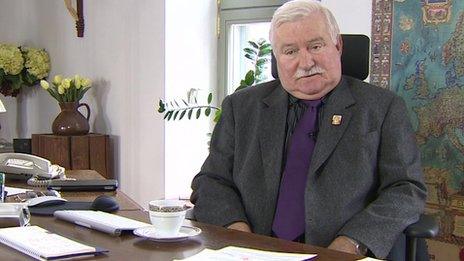
"My work here is done." Twenty-five years after leading Poland to its first democratic elections, that is the message of the former Polish solidarity leader Lech Walesa.
"I've done my job here, I fought with communism and now... democracy prevails," says the 71-year-old, who still lives in the picturesque town of Gdansk in northern Poland, home to the shipyards where he made his name leading the strikes that would eventually become the catalyst for the fall of Soviet communism.
"If somebody had told me [when I was younger] that I would be the leader to bring down communism... I never would have believed them. That is why I am the happiest man in the whole galaxy."
But Mr Walesa, who went on to be Poland's president as it transformed into a capitalist economy, is not entirely satisfied with the way things have worked out.
"Under communism everybody was equally poor and now some people - not necessarily the smartest - have wealth and most people don't have it."
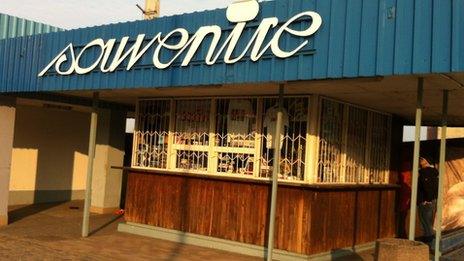
The souvenir shop at the famous Gate 2 shipyard in Gdansk
The historic shipyards where he worked are no longer the economic force they once were. The famous Gate 2 - centre of the solidarity strikes - is now a tourist attraction with a souvenir shop beside it. There is more activity further along the docks - but parts of it are an expansive wasteland.
As we arrive, the final touches are being made to a ship by workers at the Gdansk Shipyard Group Towers (GSG Towers).
Poland's path to a free market
After seven years and tens of millions pounds, it may be the last ship to be made from start to finish by this particular company, which went bankrupt in 1997 before being bought up by new investors the following year.
The shipyard was designed to make big ships that need big investments with big lead times, explains Adam Kowalski, vice-president as GSG Towers, and the market now is about small ships. In addition the global competition means that it is just not economically viable anymore.
"We have diversified into three businesses now - wind farms and turbines, offshore constructions such as oil and gas platforms and pieces of ships for bigger customers," he says.
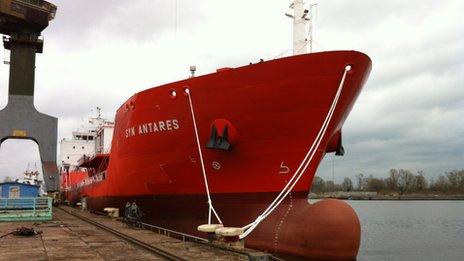
One of the few big ships still being built at the Gdansk shipyards
It's a thoroughly capitalist story of adapting to the market to survive, symbolic of Poland's transition from communism, and the way that it has embraced capitalism.
Of all the former communist states, it has been the most economically successful. It has seen steady, uninterrupted growth and was the only EU country to avoid recession after the financial crisis.
At the other end of the country from the shipyards, in southern Poland lies the manufacturing plant of Fiat Poland - or FSM as it was known in its state-owned communist days.
When Fiat bought the company in 1992 it was one of the first major privatisations by a foreign investor post-communism. The Italian company streamlined the operation to turn it from a loss-making business into a highly efficient, profitable one with state-of-the-art technology.
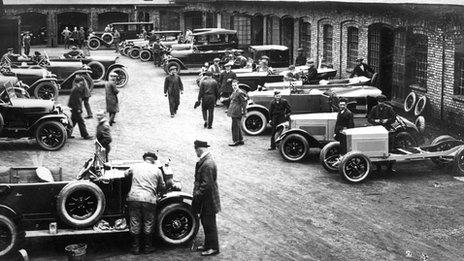
Fiat's history in Poland dates back to 1921
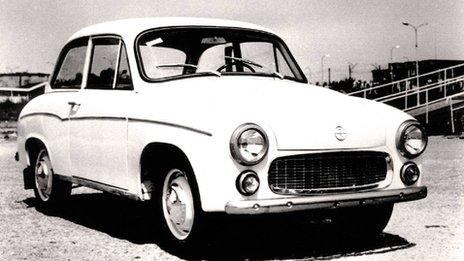
After World War Two Poland ended its contract with Fiat. During the communist era the state owned car firm FSM made the Syrena car
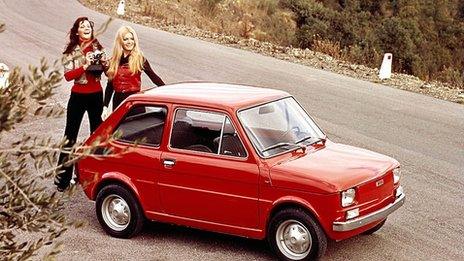
In a secret ceremony in 1965 Poland signed an agreement to make Fiat cars again
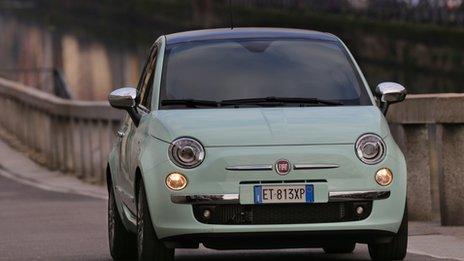
The Fiat 500 is made in the Tychy plant in the south of Poland
FSM used to make lawnmowers, bikes, shaving equipment and even machetes for Cuba with which to cut sugar cane. Now the factory just makes cars - churning out 4,700 a week (with another plant making powertrains).
The workers at its plant in Tychy describe a complete transformation.
"The conditions were very different from the 70s... the level of hygiene is nothing to compared with conditions we have now, " says Jozef Filipiak.
"We used to joke that whoever was the least hygienic went further up in this company."
Indeed in the company's own handbook the former boss of FSM is quoted as saying: "Quality was like a weather forecast - you just hoped everything would work out well."
It goes on to say that FSM operated "like a confederation of 20 independent and spread out entities, each managed as a separate company, frequently competing against each other".
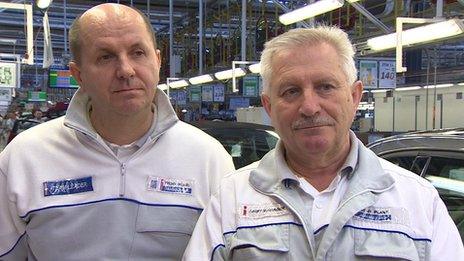
Wojciech Checinski and Jozef Filipiak have both worked at this car plant since the 1970s
The workers who've been there since the communist days don't remember it all badly. One tells me about the cheap holidays the company used to provide for workers, in the Polish countryside or on the Black Sea, and another about the childcare facilities. There's a sense that while it may all be more modern now they've lost some of their security.
Their livelihoods depend on the success of the company - and they know from bitter experience that when the factory makes fewer cars, jobs will go.
"I remember in the 70s we had only a part of production and took no wider responsibility," says Wojciech Checinski. "Now if we don't make the car we have no money."
But for the moment the future at Fiat Poland looks bright. Production of the next generation Fiat 500 will be ramped up towards the end of next year and a new five-door version is expected to be built there in early 2016.
As Poland builds on its transition to capitalism - one man is watching the country especially carefully.
"I'm an old man and I'm thinking about the other life," says Lech Walesa.
"I will be watching from up there and looking at what you're doing down below."